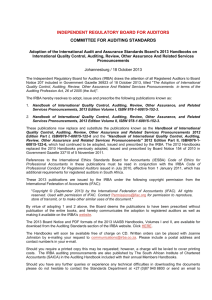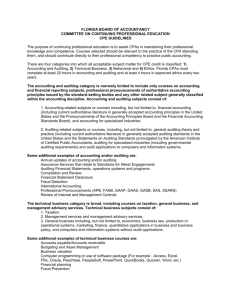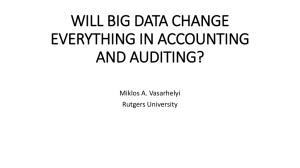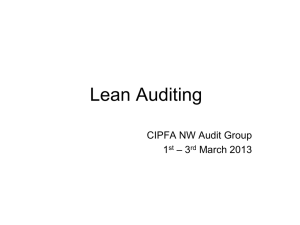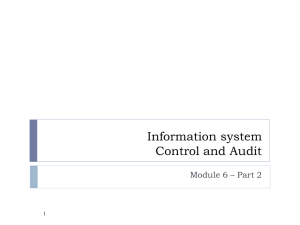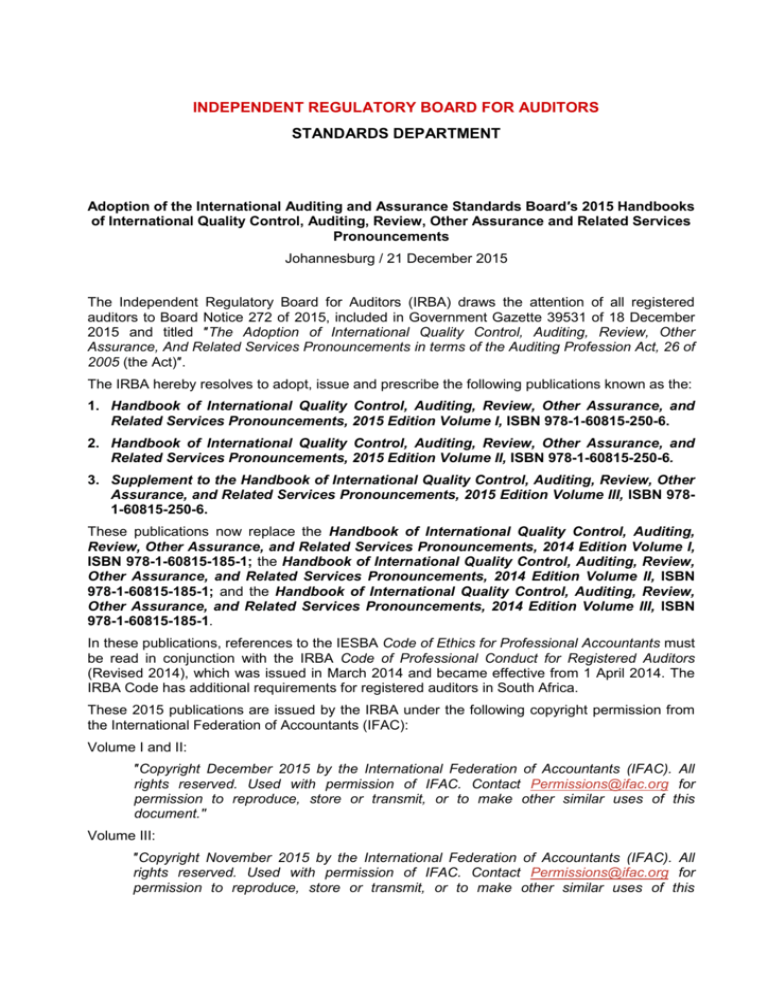
INDEPENDENT REGULATORY BOARD FOR AUDITORS
STANDARDS DEPARTMENT
Adoption of the International Auditing and Assurance Standards Board′s 2015 Handbooks
of International Quality Control, Auditing, Review, Other Assurance and Related Services
Pronouncements
Johannesburg / 21 December 2015
The Independent Regulatory Board for Auditors (IRBA) draws the attention of all registered
auditors to Board Notice 272 of 2015, included in Government Gazette 39531 of 18 December
2015 and titled ″The Adoption of International Quality Control, Auditing, Review, Other
Assurance, And Related Services Pronouncements in terms of the Auditing Profession Act, 26 of
2005 (the Act)″.
The IRBA hereby resolves to adopt, issue and prescribe the following publications known as the:
1. Handbook of International Quality Control, Auditing, Review, Other Assurance, and
Related Services Pronouncements, 2015 Edition Volume I, ISBN 978-1-60815-250-6.
2. Handbook of International Quality Control, Auditing, Review, Other Assurance, and
Related Services Pronouncements, 2015 Edition Volume II, ISBN 978-1-60815-250-6.
3. Supplement to the Handbook of International Quality Control, Auditing, Review, Other
Assurance, and Related Services Pronouncements, 2015 Edition Volume III, ISBN 9781-60815-250-6.
These publications now replace the Handbook of International Quality Control, Auditing,
Review, Other Assurance, and Related Services Pronouncements, 2014 Edition Volume I,
ISBN 978-1-60815-185-1; the Handbook of International Quality Control, Auditing, Review,
Other Assurance, and Related Services Pronouncements, 2014 Edition Volume II, ISBN
978-1-60815-185-1; and the Handbook of International Quality Control, Auditing, Review,
Other Assurance, and Related Services Pronouncements, 2014 Edition Volume III, ISBN
978-1-60815-185-1.
In these publications, references to the IESBA Code of Ethics for Professional Accountants must
be read in conjunction with the IRBA Code of Professional Conduct for Registered Auditors
(Revised 2014), which was issued in March 2014 and became effective from 1 April 2014. The
IRBA Code has additional requirements for registered auditors in South Africa.
These 2015 publications are issued by the IRBA under the following copyright permission from
the International Federation of Accountants (IFAC):
Volume I and II:
″Copyright December 2015 by the International Federation of Accountants (IFAC). All
rights reserved. Used with permission of IFAC. Contact Permissions@ifac.org for
permission to reproduce, store or transmit, or to make other similar uses of this
document.″
Volume III:
″Copyright November 2015 by the International Federation of Accountants (IFAC). All
rights reserved. Used with permission of IFAC. Contact Permissions@ifac.org for
permission to reproduce, store or transmit, or to make other similar uses of this
document.″
By virtue of adopting 1, 2 and 3 above, the Board deems the publications to have been
prescribed without the publication of the entire books, and hereby communicates the adoption to
registered auditors as well as makes them available on the IRBA's website www.irba.co.za.
The 2015 Board Notice and PDF formats of the 2015 IAASB Handbooks, Volumes I, II and III,
are available for download from the Auditing Standards section of the IRBA website. Click here.
The IRBA auditing pronouncements are also published by the South African Institute of
Chartered Accountants (SAICA) in the 2015/2016 Student Handbook - International Auditing
Standards.
Should you have any further queries, please do not hesitate to contact the Standards
Department by email at standards@irba.co.za.
Imran Vanker
Director: Standards
About the IRBA
The objective of the IRBA is to endeavour to protect the financial interests of the South African public and
international investors in South Africa through the effective and appropriate regulation of audits conducted by
registered auditors, in accordance with internationally recognised standards and processes.
The statutory responsibilities of the CFAS are to assist the IRBA to develop, maintain, adopt, issue or prescribe
auditing pronouncements; to consider relevant international changes by monitoring developments by other auditing
standard-setting bodies and sharing information where requested; and to promote and ensure the relevance of
auditing pronouncements.

